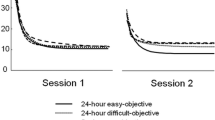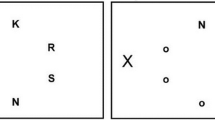Abstract
Task switching studies revealed that the usual response-repetition benefit is abolished and often reversed if the task switches. According to episodic binding accounts, performing responses strengthens task-specific bindings, leading to response-repetition benefits in task repetitions, whereas such bindings can lead to interference (i.e., costs of “unbinding”) in task switches. An alternative account assumes that responses are generally inhibited after execution but that the assumed sequential carryover of response inhibition is overcompensated by positive priming of stimulus category in task repetitions (resulting in a positive net effect in response-repetition conditions). In the present study, we manipulated task-cue modality (visual vs. auditory) to introduce a variation of encoding and retrieval context, which should vary the strength of episodic bindings. Across two experiments (Experiment 1A, showing the initial evidence, and Experiment 1B, providing a successful replication), we found that the response-repetition benefit in task repetitions was substantially larger with repeated cue modality than with changed cue modality, suggesting that cue modality primes retrieval of task-specific stimulus categories and responses. However, the observed response-repetition cost in task switches remained unaffected by this contextual change. This data pattern suggests a hybrid account, assuming that response-repetition benefits are driven by episodic bindings, whereas response-repetition costs are primarily due to (non-episodic) carryover of response inhibition.



Similar content being viewed by others
References
Altmann, E. M. (2011). Testing probability matching and episodic retrieval accounts of response repetition effects in task switching. Journal of Experimental Psychology: Learning, Memory, and Cognition, 37, 935–951.
Altmann, E. M., & Gray, W. D. (2008). An integrated model of cognitive control in task switching. Psychological Review, 115, 602–639.
Druey, M. D. (2014). Stimulus-category and response-repetition effects in task switching: An evaluation of four explanations. Journal of Experimental Psychology: Learning, Memory, and Cognition, 40, 125–146.
Druey, M. D., & Hübner, R. (2008). Response inhibition under task switching: Its strength depends on the amount of task-irrelevant response activation. Psychological Research Psychologische Forschung, 72, 515–527.
Forstmann, B. U., Brass, M., & Koch, I. (2007). Methodological and empirical issues when dissociating cue-related from task-related processes in the explicit task-cuing procedure. Psychological Research Psychologische Forschung, 71, 393–400.
Frings, C., Schneider, K. K., & Moeller, B. (2014). Auditory distractor processing in sequential selection tasks. Psychological Research Psychologische Forschung, 78, 411–422.
Gade, M., Schuch, S., Druey, M., & Koch, I. (2014). Inhibitory control in task switching. In J. Grange & G. Houghton (Eds.), Task switching and cognitive control (pp. 137–159). Oxford: Oxford University Press.
Grzyb, K. R., & Hübner, R. (2013). Excessive response-repetition costs under task switching: How response inhibition amplifies response conflict. Journal of Experimental Psychology: Learning, Memory, and Cognition, 39, 126–139.
Henson, R. N., Eckstein, D., Waszak, F., Frings, C., & Horner, A. J. (2014). Stimulus-response bindings in priming. Trends in Cognitive Sciences, 18, 376–384.
Hommel, B. (2009). Action control according to TEC (theory of event coding). Psychological Research Psychologische Forschung, 73, 512–526.
Horoufchin, H., Philipp, A. M., & Koch, I. (2011). The dissipating task-repetition benefit in cued task switching: Task-set decay or temporal distinctiveness? Journal of Experimental Psychology: Human Perception and Performance, 37, 455–472.
Hübner, R., & Druey, M. D. (2006). Response execution, selection, or activation: What is sufficient for response-related repetition effects under task shifting? Psychological Research Psychologische Forschung, 72, 515–527.
Jeffreys, H. (1961). Theory of probability. Oxford: Oxford University Press.
Jost, K., De Baene, W., Koch, I., & Brass, M. (2013). A review of the role of cue processing in task switching. Journal of Psychology/Zeitschrift für Psychologie, 221, 5–14.
Kiesel, A., Steinhauser, M., Wendt, M., Falkenstein, M., Jost, K., Philipp, A. M., & Koch, I. (2010). Control and interference in task switching–A review. Psychological Bulletin, 136, 849–874.
Kleinsorge, T., & Heuer, H. (1999). Hierarchical switching in a multi-dimensional task space. Psychological Research Psychologische Forschung, 62, 300–312.
Koch, I., & Allport, A. (2006). Cue-based preparation and stimulus-based priming of tasks in task switching. Memory & Cognition, 34, 433–444.
Koch, I., Gade, M., Schuch, S., & Philipp, A. M. (2010). The role of inhibition in task switching: A review. Psychonomic Bulletin & Review, 17, 1–14.
Koch, I., Schuch, S., Vu, K.-P., & Proctor, R. W. (2011). Response-repetition effects in task switching—dissociating effects of anatomical and spatial response discriminability. Acta Psychologica, 136, 399–404.
Logan, G. D., & Bundesen, C. (2003). Clever homunculus: Is there an endogenous act of control in the explicit task-cuing procedure? Journal of Experimental Psychology: Human Perception and Performance, 29, 575–599.
Monsell, S. (2003). Task switching. Trends in Cognitive Sciences, 7, 134–140.
Oberauer, K., Souza, A. S., Druey, M. D., & Gade, M. (2013). Analogous mechanisms of selection and updating in declarative and procedural working memory: experiments and a computational model. Cognitive Psychology, 66, 157–211.
Rogers, R. D., & Monsell, S. (1995). The cost of a predictable switch between simple cognitive tasks. Journal of Experimental Psychology: General, 124, 207–231.
Rouder, J. N., Speckman, P. L., Sun, D., Morey, R. D., & Iverson, G. (2009). Bayesian t-tests for accepting and rejecting the null hypothesis. Psychonomic Bulletin & Review, 16, 225–237.
Schneider, D. W., & Logan, G. D. (2005). Modeling task switching without switching tasks: A short-term priming account of explicitly cued performance. Journal of Experimental Psychology: General, 134, 343–367.
Schuch, S., & Koch, I. (2004). The costs of changing the representation of action: Response repetition and response-response compatibility in dual tasks. Journal of Experimental Psychology: Human Perception and Performance, 30, 566–582.
Schuch, S., & Koch, I. (2010). Response-repetition effects in task switching with and without response execution. Acta Psychologica, 135, 302–309.
Steinhauser, M., Hübner, R., & Druey, M. (2009). Adaptive control of response preparedness in task switching. Neuropsychologia, 47, 1826–1835.
Vandierendonck, A., Liefooghe, B., & Verbruggen, F. (2010). Task switching: Interplay of reconfiguration and interference control. Psychological Bulletin, 136, 601–626.
Wagenmakers, E. J. (2007). A practical solution to the pervasive problems of p values. Psychonomic Bulletin and Review, 14, 779–804.
Wetzels, R., Matzke, D., Lee, M. D., Rouder, J. N., Iverson, G. J., & Wagenmakers, E.-J. (2011). Statistical evidence in experimental psychology: An empirical comparison using 855 t tests. Perspectives on Psychological Science, 6, 291–298.
Author information
Authors and Affiliations
Corresponding author
Ethics declarations
Conflict of interest
The authors declare that they have no conflict of interest. All procedures performed in studies involving human participants were in accordance with the ethical standards of the institutional and/or national research committee and with the 1964 Helsinki declaration and its later amendments or comparable ethical standards. Informed consent was obtained from all individual participants included in the study.
Rights and permissions
About this article
Cite this article
Koch, I., Frings, C. & Schuch, S. Explaining response-repetition effects in task switching: evidence from switching cue modality suggests episodic binding and response inhibition. Psychological Research 82, 570–579 (2018). https://doi.org/10.1007/s00426-017-0847-9
Received:
Accepted:
Published:
Issue Date:
DOI: https://doi.org/10.1007/s00426-017-0847-9




